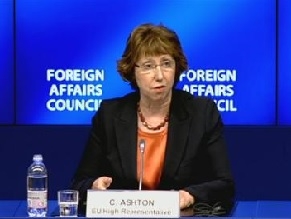|
World Jewish News

''We believe that, in the end, a solution that brings people together to find a political process is absolutely necessary. And the longer we wait, the more people get killed," EU foreign policy chief Catherine Ashton said during a visit in
|
Ashton reiterates need to find a diplomatic solution to Syrian conflict
27.08.2013, Israel and the World EU foreign policy chief Catherine Ashton said Monday the world need to find a diplomatic solution to the escalating conflict in Syria.
"We believe that, in the end, a solution that brings people together to find a political process is absolutely necessary. And the longer we wait, the more people get killed," she said during a visit to Tallinn, Estonia.
"The longer the parties are not prepared to sit down and work it out, the more children have no school, have nowhere to live, their families have to live in refugee camps. The longer that this goes on, the more countries in this region suffer from having to house huge numbers of refugees."
Ashton said she has stressed the need to end the violence in "recent conversations with China and Russia." She also said it is important that UN weapons inspectors are allowed to examine the evidence of a potential chemical gas attack "as quickly as possible to reach a conclusion."
Ashton last week called for a "thorough and immediate" investigation into the alleged chemical attack near Damascus
Russia has joined the EU in its call for an independent UN investigation of the deadly chemical attack that the Syrian government allegedly carried out against civilians last Wednesday.
The European Parliament foreign affairs committee has scheduled a special meeting on Wednesday in Brussels to discuss the humanitarian situation in Syria as well as the latest dramatic events in Egypt.
Britain and France on Monday called for a Western intervention in Syria, including possible military strikes.
BritishPrime Minister David Cameron cut short a vacation to convene an emergency meeting of security advisers Tuesday or Wednesday and may summon Parliament from its summer recess.
British Foreign Minister William Hague, declared that a mandate from the UN was not necessary for the West to act.
He told the BBC . “Is it possible to respond to chemical weapons without complete unity on the UN Security Council? I would argue yes, it is. Otherwise, of course, it might be impossible to respond to such outrages.”
French President Francois Hollande said the West’s response “will be decided this week” and could encompass airstrikes, toughened sanctions and arming of the rebels fighting Assad’s regime.
“We will also leave a little time for the diplomatic process, but not too much time,” Hollande told the newspaper Le Parisien. “We cannot not react to the use of chemical weapons.”
Hollande spoke to President Obama and told him that France, like Britain, would be at his side if “an action of force” was decided upon.
US Secretary of State John Kerry said that Syria's use of chemical weapons is “undeniable,” and that “this international norm cannot be violated without consequences.”
He said that evidence now being gathered by United Nations experts on the ground in Syria was important but was not necessary to prove what is already “grounded in facts, informed by conscience and guided by common sense.”
Kerry left little doubt that the decision for the US is not whether to take military action, but when.
by: Yossi Lempkowicz
EJP
|
|
